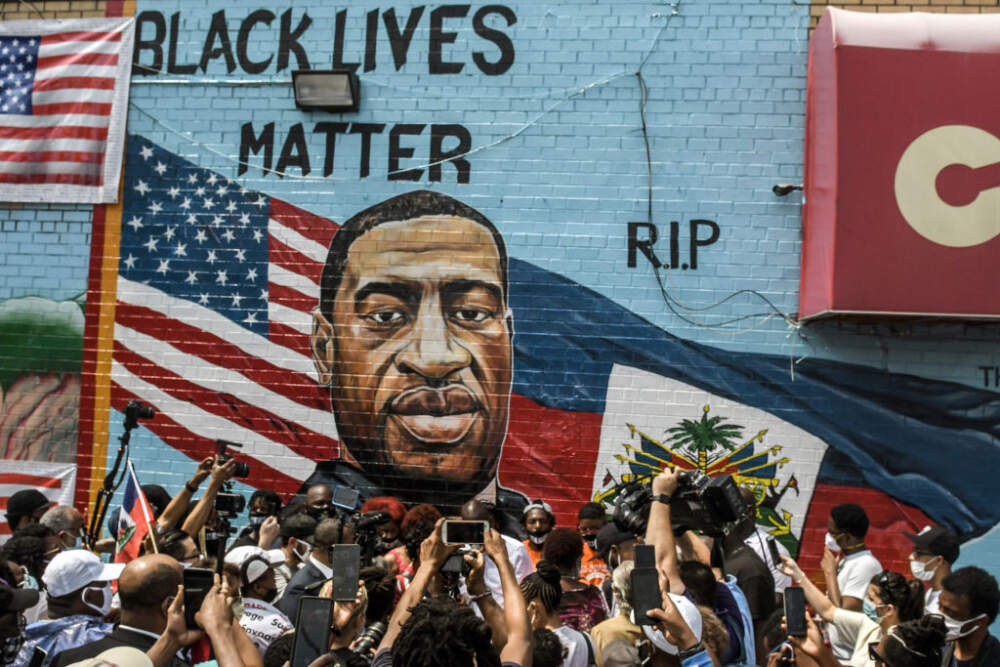Advertisement
Commentary
George Floyd’s murder ushered in big talk of equity and justice. 3 years later, this work is still a matter of life and death

Last week marked three years since George Floyd’s murder.
In the weeks and months that followed the tragedy of that day, it seemed as though America had finally woken up, finally seen the way that racism pervades every system in our country. The anguish and the rage of people who had marched for Mike Brown and Freddie Gray and Tamir Rice, and so many others, was finally being heard in boardrooms and state houses, in newsrooms and courthouses.
Across the country, an unprecedented commitment of $200 billion was pledged to racial equity initiatives and non-profit organizations by corporate America. Many politicians and CEOs were suddenly unafraid to say “Black Lives Matter.” For a moment, it felt like real change was possible.
Three years later, it feels like America is starting to look away — and Massachusetts is just a microcosm of what’s happening on the national stage represents.
The movement for Black lives prompted a racist backlash against “wokeness.” Today, it’s a movement led by people like Florida Gov. Ron DeSantis and picked up by right wing politicians and commentators across the country, which seeks to ban books that discuss racism, whitewash American history and end affirmative action. To hear these politicians speak is to see and hear echoes of George Wallace blocking the schoolhouse door in Alabama.
Three years later, it feels like America is starting to look away -- and Massachusetts is just a microcosm of what’s happening on the national stage represents.
Meanwhile, progressive activists are fighting battles on multiple fronts – not only for racial justice, but for trans rights and gay rights and to safeguard whatever reproductive freedom remains in our post-Roe country.
All told, the political landscape looks very different than it did just three years ago.
The story from the private sector is just as troubling. Of the $200 billion in corporate commitments pledged to further racial equity, the vast majority have yet to be fulfilled. One analysis showed that just 8% of corporate commitments came in the form of direct grants to individuals or corporations, while the remaining 92% came in the form of loans or investments that could lead to profit.
Of the corporate funding that was allocated for grants, most of it came in the form of one-time gifts — hardly a recipe for building the sustained and significant financial resources organizations need to disrupt systemic racism over many years. And, out of the donations given, only about a quarter went toward organizations working explicitly to build power in communities of color.
Advertisement
In my own work leading The New Commonwealth Fund for Racial Equity and Social Justice (which was founded in the days following Mr. Floyd’s murder and amidst the Covid-19 pandemic), I’ve felt this shift in mindset.
[We] are helping our partners understand that this fight for racial justice requires a commitment to stare our history directly in the face and not just pledge to do better.
We are fortunate to have a dedicated group of founders and donors who are committed to ending systemic racism in the commonwealth, no matter what it takes. But as we work to build a fund that can create change for the long haul, we are helping our partners understand that this fight for racial justice requires a commitment to stare our history directly in the face and not just pledge to do better.
We must actually reconstruct the systems and practices that have historically protected racial, social and economic disparities. The opportunities here are myriad, but one where Massachusetts could set a national example is raising the age of juvenile jurisdiction from 18 to 21 — which would have profound societal benefits and appears to be a priority for the State Senate.
We must, under no circumstances, be patient or take our time, because this work is quite literally a matter of life or death. A recent research paper, based on CDC data, found that health inequities and racism in the U.S. translated into 80 million years of potential life lost between 1999-2020. That’s 80 million years of Black life, lost to the manifestations of racism.
When I look at the Black and brown leaders we support at the New Commonwealth Fund, I see Black joy, creativity and resilience. I see leaders and organizations that will transform our health, education, economic and justice systems from structures of oppression into pathways of liberation. Leaders like Leon Smith at Citizens for Juvenile Justice, Nashira Baril, founder of the Neighborhood Birth Center (Boston’s first midwife-operated birth center), and Shaheer Mustafa at Hopewell, which works to eliminate the disparities between children and youth who have experienced foster care and those who have not.
But this will only happen if we begin by doing what is necessary to support and resource them with equity and respect. This means we must start by operating from the foundational belief that those who are most proximate to a community’s challenges are most readily armed with solutions. I am more sure of this fact today than I have ever been before.
On this third anniversary of George Floyd’s murder — when America is reminded, yet again, of how it treats Black life — let us commit to holding ourselves accountable for not letting this conversation die down, when the media is no longer talking about George Floyd, or Breonna Taylor, or Jordan Neely. When we can keep that conversation present and energized and on the streets — even in the absence of a national spotlight — then we have a shot at ending systemic racism in our time.
